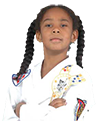The Karate for Kids Program
Team PRIDE contracts with highly-qualified, specially-certified martial arts instructors who are trained to offer a nationally-recognized after-school program to at-risk youth nationwide. The program, which is called Karate for Kids,® combines mentorship and leadership with the traditions of the Songahm Taekwondo to teach children Perseverance, Respect, Integrity, Discipline and Excellence (PRIDE).
The Karate for Kids program was developed by the American Taekwondo Association to help children build "strong bodies and clear minds." The American Taekwondo Association (ATA) is an international martial arts organization with over 800 schools in North America, serving over 150,000 students. The ATA oversees curriculum development for the Songahm style of Taekwondo, which is a Korean martial art. To earn ATA certification, Taekwondo instructors undergo rigorous training in pedagogy, class management and other skills. Only ATA-certified instructors are licensed to offer the Karate for Kids program.
The Karate for Kids program teaches goal-setting, develops important values, and provides incentives and rewards for educational and other accomplishments. Instructors are trained to present the Taekwondo curriculum and to teach values in a secular and age-appropriate manner. Class exercises, illustrative stories and supporting materials are designed to match the physical and cognitive level of the students. The values that are central to Karate for Kids classes are conveyed in several ways:
- Orally - Instructors designate a weekly or monthly theme (such as respect or courtesy) and spend a part of each class discussing that theme with Karate for Kids students in order to help them understand what it means and how it is relevant in their lives.
- Through modeling - Instructors are role models for their students, and their behavior reflects the values they want their students to internalize. As students advance in rank, they are expected to earn the respect of beginning students by demonstrating those values.
- Experientially - Class activities are designed to reinforce the values and themes of the Karate for Kids program. For example, a sparring match serves as a lesson in self-control and courtesy. An exercise that requires students to work slowly through a choreographed "form," or sequence of movements, teaches discipline and focus. Activities like these make the values immediately relevant to the students within the class. And the Karate for Kids incentive system of patches and stars teaches children to apply these values to their lives outside of the martial arts school.
The Star System
All children enrolled in the Karate for Kids program sew a V-shaped patch (for "victory") on their Taekwondo uniforms. Instructors attach stars to each child's Karate for Kids patch as a reward for demonstrating positive values and constructive behavior at the Taekwondo center, at school, and at home.
Children earn blue stars by demonstrating values like courtesy, self-control, confidence and discipline in the Karate for Kids classroom. Gold stars are awarded for academic progress in school, especially for improvement from one report card to the next. And silver stars are a reward for "special performances" at home or in the community. These "special performances" can include helping around the house (washing dishes, making their own bed, learning to tie their shoes), contributing to the community (selling raffle tickets for a charity, participating in a math-a-thon), or anything else that the children and their guardians feel is important.
The Star System teaches children to set realistic goals for self-improvement. Children and their guardians are encouraged to meet regularly with the Karate for Kids instructor to agree on certain goals and discuss exactly what the children need to do in order to accomplish those goals and earn stars. The goals are individualized to meet the needs and challenge the abilities of every child. Parents or guardians complete regular written evaluations to inform the instructor of their children's progress toward meeting the goals.
The Classes
The Taekwondo classes teach non-aggressive, disciplined behavior. The physical movements that students learn have practical self-defense applications, but the classes are structured to reinforce at all times the need for self-control, discipline and respect. Students bow to one another before and after working together. They call each other and their instructors "sir" and "ma'am" in order to maintain an atmosphere of respect. They wear special traditional white uniforms to reinforce the importance of clearing their minds and developing a new mode of conduct. At the beginning and end of each class they recite the following "student oath":
Each day I will live by honoring my parents and instructors
Practicing to the best of my ability
And having courtesy and respect for everyone I meet.
Karate for Kids students are taught to control their bodies at all times, and to practice the values embodied by the acronym PRIDE: Perseverance, Respect, Integrity, Discipline and Excellence.

